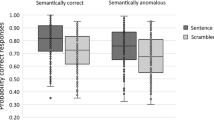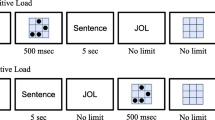Abstract
Participants read 56 sentence pairs and attempted to judge if the context sentence of each pair was related to the figurative message of the following simile. Reaction times and error rates both indicated that (a) participants could judge subject-related contexts more easily that predicate-related contexts, (b) they could judge irrelevant contexts more easily than misleading ones, and (c) these two effects were relatively independent of one another. The cued recall of similes previously paired with relevant or misleading contexts was affected by both a context effect (contexts containing a simile's predicate led to better recall than those containing its subject) and, even more strongly, a cuing effect (the simile's predicate was a better cue than its subject), whereas the cued recall of similes previously paired with irrelevant contexts was affected only by the context effect. In no case was there evidence of an interaction that would have indicated that a cue would be more potent if it referred to the same simile term as had the context.
Similar content being viewed by others
References
Craik, F.I.M., & Tulving, E. (1975). Depth of processing and the retention of words in episodic memory.Journal of Experimental Psychology: General, 104, 268–294.
Crowder, R.G. (1980). Echoic memory and the study of aging memory systems. In L. W. Poon, J.L. Fozard, L.S. Cermak, D. Arenberg, & L.W. Thompson (Eds.),New directions in memory and aging (pp. 181–204). Hillsdale, New Jersey: Erlbaum.
Gildea, P., & Glucksberg, S. (1983). On understanding metaphor: The role of context.Journal of Verbal Learning and Verbal Behavior, 22, 577–590.
Glucksberg, S., Gildea, P., & Bookin, H.A. (1982). On understanding nonliteral speech: Can people ignore metaphors?Journal of Verbal Learning and Verbal Behavior, 21, 85–98.
Harris, R.J. (1979). Memory for metaphors.Journal of Psycholinguistic Research, 8, 61–71.
Harris, R.J., Lahey, M.A., & Marsalek, F. (1980). Metaphors and images: Rating, reporting, and remembering. In. R.P. Honeck & R.R. Hoffman (Eds.),Cognition and figurative language (pp. 163–181). Hillsdale, New Jersey: Erlbaum.
Hoffman, R.R. (1983). Recent research on metaphor.Recherches Semiotiques/ Semiotic Inquiry, 3, 35–62.
Honeck, R.P. (1973). Interpretive versus structural effects on semantic memory.Journal of Verbal Learning and Verbal Behavior, 12, 448–455.
Hornby, P.A. (1972). The psychological subject and predicate.Cognitive Psychology, 3, 632–642.
Inhoff, A.W., Lima, S.D., & Carroll, P.J. (1984). Contextual effects on metaphor comprehension in reading.Memory and Cognition, 12, 558–567.
Jacoby, L.L., Craik, F.I.M., & Begg, I. (1979). Effects of decision difficulty on recognition and recall.Journal of Verbal Learning and Verbal Behavior, 18, 585–600.
Kroll, N.E.A., Berrian, R.W., & Kreisler, A.F. (1978). The comprehension and memory of similes as a function of context. In M.M. Gruneberg, P.E. Morris, & R.N. Sykes (Eds.),Proceedings of the International Conference on Practical Aspects of Memory. London & New York: Academic Press.
Kroll, N.E.A., Kreisler, A.F., & Berrian, R.W. (in press). A metaphor is like a foggy day: Developing an empirical basis for the understanding of metaphors. In J.B. Sidowski (Ed.),Conditioning, cognition, and methodology: Contemporary issues in experimental psychology, Hillsdale, New Jersey: Erlbaum.
Loftus, G.R. (1978). On the interpretation of interactions.Memory and Cognition, 6, 312–319.
Malgady, R.G., & Johnson, M.G. (1977). Recognition memory for literal, figurative, and anomalous sentences.Bulletin of the Psychonomic Society, 9, 214–216.
Marschark, M., & Hunt, R.R. (1985). On memory for metaphor.Memory and Cognition, 13, 413–424.
McCabe, A. (1983). Conceptual similarity and the quality of metaphor in isolated sentences versus extended contexts.Journal of Psycholinguistic Research, 12, 41–68.
O'Brien, E.J., & Myers, J.L. (1985). When comprehension difficulty improves memory for text.Journal of Experimental Psychology: Learning, Memory, and Cognition, 11, 12–21.
Ortony, A., Schallert, D.L., Reynolds, R.E., & Antos, S.J. (1978). Interpreting metaphors and idioms: Some effects of context on comprehension.Journal of Verbal Learning and Verbal Behavior, 17, 465–477.
Paivio, A. (1979). Psychological processes in the comprehension of metaphor. In A. Ortony (Ed.),Metaphor and thought (pp. 150–171). London, England: Cambridge University Press.
Stein, B. (1977). The effects of cue-target uniqueness on cued recall performance.Memory and Cognition, 5, 319–322.
Tulving, E., & Thomson, D.M. (1973). Encoding specificity and retrieval processes in episodic memory.Psychological Review, 80, 352–373.
Tversky, A. (1977). Features of similarity.Psychological Review, 84, 327–352.
Verbrugge, R.R., & McCarrell, N.S. (1977). Metaphoric comprehension: Studies in reminding and resembling.Cognitive Psychology, 9, 494–533.
Author information
Authors and Affiliations
Rights and permissions
About this article
Cite this article
Kroll, N.E.A., Schepeler, E.M. The comprehension and recall of similes as a function of context and cue. J Psycholinguist Res 16, 101–132 (1987). https://doi.org/10.1007/BF01071998
Accepted:
Issue Date:
DOI: https://doi.org/10.1007/BF01071998




